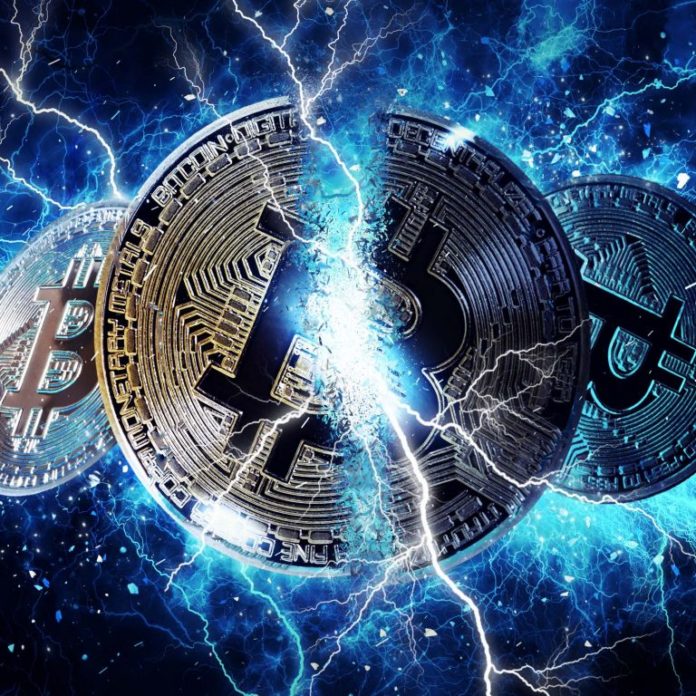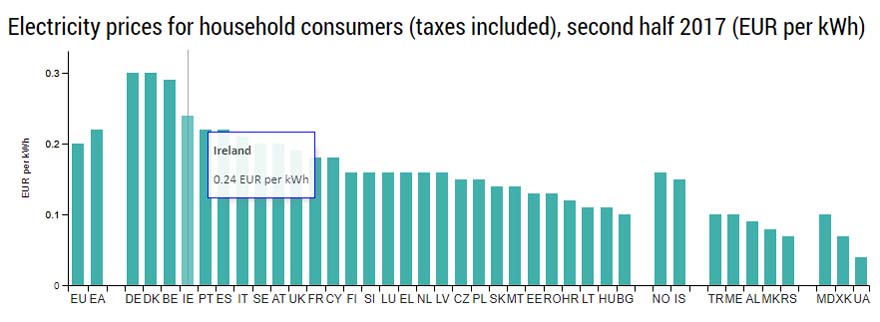
A mainstream media assertion made recently implies that cryptocurrency is quite costly in terms of energy consumption. “Bitcoin has been alarming people for years,” the report notes, pointing to the amount of electricity used for its mining – almost as much as a small nation needs. But is that really so?
Also read: Japanese Internet Giant GMO Boosts Own Bitcoin Mining Output With 7nm Rigs
Bitcoin Said to Use ‘Almost’ as Much Electricity as Ireland
 Mainstream media is often preoccupied with exploring and revealing the negative effects of cryptocurrencies. A common criticism towards Bitcoin is that its energy-intensive mining is too expensive for the planet.
Mainstream media is often preoccupied with exploring and revealing the negative effects of cryptocurrencies. A common criticism towards Bitcoin is that its energy-intensive mining is too expensive for the planet.
The latest mention of this feature comes from a respectable outlet. In an article titled “Why bitcoin uses so much energy”, “The Economist explains” the reasons noting that “Bitcoin has been alarming people for years because of the amount of electricity needed to mint new virtual coinage.”
The magazine quotes Alex de Vries, a bitcoin specialist at PwC, who estimates that “the current global power consumption for the servers that run bitcoin’s software is a minimum of 2.55 gigawatts (GW), which amounts to energy consumption of 22 terawatt-hours (TWh) per year – almost the same as Ireland.” The piece adds that bitcoin miners consume more and more power with no signs of a slowdown. “Why does bitcoin require so much energy to make something that exists only electronically?” the Economist asks.
Let’s skip the lecture on how bitcoin transactions are recorded in the ledger, how “the miners’ race, known as ‘proof of work’, could be superseded by ‘proof of stake’,” and get straight to the point by asking in our turn – Does Bitcoin really spend as much electricity as Ireland, and what does “almost the same” consumption really mean?
Bitcoin Burns at Least One Malta Less Than Ireland
 It seems the Economist got it wrong in two respects. Let’s take a look at the energy consumption of Ireland first. According to the data compiled in the CIA World Factbook, the country has used 25 TWh of electrical power in 2017, and over 26 TWh yearly between 2011 and 2014. Consumption, in this case, means the total electricity generated in the country, plus imports and minus exports, as quoted by Indexmundi. And according to Eurostat, Ireland is among the EU countries with the highest increase in gross energy consumption – 38% between 1990 and 2015, when it consumed almost 24 TWh.
It seems the Economist got it wrong in two respects. Let’s take a look at the energy consumption of Ireland first. According to the data compiled in the CIA World Factbook, the country has used 25 TWh of electrical power in 2017, and over 26 TWh yearly between 2011 and 2014. Consumption, in this case, means the total electricity generated in the country, plus imports and minus exports, as quoted by Indexmundi. And according to Eurostat, Ireland is among the EU countries with the highest increase in gross energy consumption – 38% between 1990 and 2015, when it consumed almost 24 TWh.
The statistics reveal a difference of 3 TWh, if we use the 2017 data for reference, between the 22 TWh claimed in the article and what Éire actually consumed last year – 25 TWh. Using a similar comparison to illustrate the discrepancy, 3 TWh is more than what Malta or Andorra need in a year – 2 TWh and change, each. So, it’s safe to say that Bitcoin uses less electricity than Ireland by a substantial margin.

Now, let’s talk about the financial side of things. Each mined BTC block currently generates 12.5 new bitcoins (the next halving will occur in 2020). A block of transactions takes 10 minutes to get mined, on average, which means approximately 1,800 bitcoins are minted each day. That translates into a daily BTC network reward of roughly a little more than $11 million (at the time of writing).
The reward should allow miners to cover their costs for electricity, but also all other expenses of their business – salaries, amortization, maintenance, rent and so on. Let’s not forget the electricity needed to power the cooling systems. Actually, the electrical energy consumed by cryptocurrency mining is believed to account for around half of all costs. Let’s assume that it’s half of the total reward, $5 or $6 million. Do you want to know how much the Irish consumers pay for their daily electricity consumption?
Last year, Eurostat revealed that Ireland has some of the most expensive electricity in Europe, actually the fourth highest rates in the EU, as of November, 2017. It has been reported that Irish customers pay an average of 23.1 cent per kilowatt-hour (kWh) of electricity, which is 13% higher than the EU average. According to Eurostat, electricity prices for household consumers in Ireland were averaging €0.24 per kWh (~$0.28, with taxes) in the second half of 2017. The simple arithmetic shows the Republic has paid an average of $19 million dollars for electricity daily, last year.

With the current state of crypto markets, it’s true that mining is getting less profitable, if not more expensive. According to a recent study, its profitability in different countries varies significantly. Using a Bitmain’s Antminer S9 at an energy consumption of 1.5 kWh earns about 0.0008 BTC in 24 hours and mining a single bitcoin requires approximately 45 MW of electricity. That means that in the Czech Republic, where electricity is priced at €0.06 per kWh (~$0.07), mining 1 BTC would cost around €3,000 (~$3,500). And in Germany or Italy, bitcoin mining is prohibitively expensive – it eats more than €6,500 ($7,500) per coin.
Do you think bitcoin mining is expensive, in terms of energy consumption and other costs? Share your thoughts on the subject in the comments section below.
Images courtesy of Shutterstock, Eurostat, CIA World Factbook, Index Mundi.
Make sure you do not miss any important Bitcoin-related news! Follow our news feed any which way you prefer; via Twitter, Facebook, Telegram, RSS or email (scroll down to the bottom of this page to subscribe). We’ve got daily, weekly and quarterly summaries in newsletter form. Bitcoin never sleeps. Neither do we.
The post Mainstream Media Claims Bitcoin Burns More Energy Than Ireland – Does It? appeared first on Bitcoin News.

Bitcoin.com is author of this content, TheBitcoinNews.com is is not responsible for the content of external sites.
Our Social Networks: Facebook Instagram Pinterest Reddit Telegram Twitter Youtube










